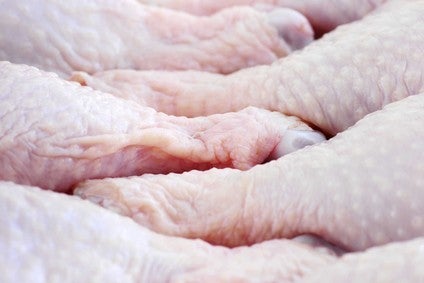
More than 70% of fresh chickens being sold in UK supermarkets are contaminated with campylobacter, a survey by the Food Standards Agency has revealed.
Asda was recorded as having the highest rate of campylobacter-contaminated chicken at 78%. Tesco had the lowest incidence levels at 64%.

Discover B2B Marketing That Performs
Combine business intelligence and editorial excellence to reach engaged professionals across 36 leading media platforms.
The results, which named retailers for the first time, followed six months of national testing. The survey is set to run for another six months. The latest results showed 18% of chickens tested positive for campylobacter above the highest level of contamination, which was above 1,000 colony forming units per gram. Contamination levels have increased between the first and second quarters, with warmer temperatures a factor, the FSA said.
“These results show that the food industry, especially retailers, need to do more to reduce the amount of campylobacter on fresh chickens,” said Steve Wearne, FSA director of policy.
“There are signs that some retailers are starting to step up to their responsibilities. When more do, we will see the sustained improvements that will help prevent many of their customers getting ill.”
A statement on the website of the British Poultry Council read: “Campylobacter is not a new phenomenon and research into the bacteria has been ongoing for decades across the globe. We have made significant improvements in detection methods and diagnostics in recent years which will aid our continuing research and measuring the effects of any potential intervention.

US Tariffs are shifting - will you react or anticipate?
Don’t let policy changes catch you off guard. Stay proactive with real-time data and expert analysis.
By GlobalData“The data released from six months of sampling shows that all producers and retailers have levels in the same range. This reinforces how universal and challenging the issue is and the complex nature of campylobacter,” it added.
A spokesperson for Asda told just-food today it was “disappointed” with the findings.
“There is no silver bullet to tackle this issue, but along with other retailers, we’re working hard to find a solution.
“We welcome the transparency of the FSA results and are committed to providing our shoppers with safe, quality food. We have led the industry in packaging innovation and were the first supermarket to launch roast-in-the-bag chicken, removing the need to handle raw meat. And we continue to work with our suppliers to ensure that we are doing everything we can to reduce the chances of our customers coming into contact with campylobacter – including investing in trialling a new procedure – SonoSteam – which, if successful, we will roll out across our suppliers.
“We also continue to offer shoppers helpful advice on how to safely prepare and cook chicken – which will kill off any trace of the bug.”
Second on the list behind Asda was The Co-operative Group, where 73% of chickens tested positive for campylobacter. Morrisons, Sainsbury’s and Waitrose saw 69% of chickens test positive. Some 67% of chickens sampled at M&S were found to have campylobacter on their skins.
In total, 1,995 samples of fresh whole chilled chickens have now been tested, with packaging also tested for most of these samples, the FSA said.
The agency said 6% of packaging tested positive for the presence of campylobacter with only one sample at the highest level of contamination.





